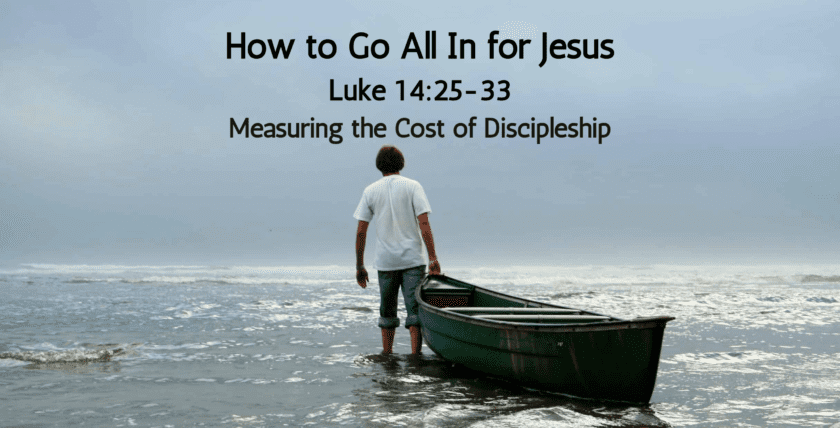I’m trying to be careful with the episode titles because I don’t want anyone to think I’m predicting something is about to happen with Israel and the Middle East situation. I’m not. In fact, I’m aware of nothing regarding the current nation of Israel related to biblical prophecy and the second coming of Christ in scripture. At least nothing more than the other nations of the world. You’ll see what I mean through this series of Matthew 24, Mark 13, and Luke 21. We must ask ourselves as believers, “Did the Great Tribulation Already Happen?” If it did, what does that mean for us today? Did Jesus already come 2,000 years ago? That’s kind of mind-blowing to think about if that’s true. To find answers to these questions, we’ll look at what Jesus said about when the temple would be destroyed and the signs of his coming and the end of the age.
When I first believed in Jesus Christ as my Savior, I was young in my experience with spiritual things, and I was very energetic and enthusiastic about what I just found in Christ. I wanted to learn everything I could as quickly as possible. I didn’t know whether the people I was listening to were on the right track or not about biblical prophecy. They were passionate and loved Jesus, and they’d been doing this awhile, so I thought they must know what Jesus wants believers to do. But passion and enthusiasm don’t always equal truth. In fact, passion and enthusiasm can often take us in a completely wrong direction. In Matthew 11:12, Jesus said when John the Baptist came preaching the kingdom of heaven to the Jews, they were hungry and desperate for any kind of hope. They were suffering under the Romans. When John preached the kingdom of heaven was at hand, the people were expecting their king, their Messiah, to lift them from their suffering. Of course, they were excited. Saying the kingdom of heaven ‘suffered violence’ here meant it was ‘pressed against aggressively’ by the listeners. They wanted to ‘grab’ that hope. They followed John, crowding around him, expecting the Messiah to appear in a glorious display of power.
Christians can be passionate about their beliefs, but passion doesn’t make you right. The Jews had passionate expectations for the Messiah and his kingdom. Some Christians also have passionate expectations about the 2nd Coming of Christ, the rapture, and the millennium, but that passion doesn’t make them right. Evangelicals are passionate about Dispensationalism and the coming age of the millennial kingdom of Christ, yet the term millennium isn’t even in the Bible. I was taught dispensationalism when I first believed. As a young Christian, I remember showing up to church one morning, and the parking lot was empty. Not a single car and no one to be seen. When I went to the church door, it was locked. I thought the rapture happened, and I was left behind. Turned out it was November, and the time changed, and I was an hour early. With study, the Lord has opened my eyes to a better understanding of his presence and his comings.
The majority of Jews not only didn’t realize who Jesus was, but they actively disagreed with the idea that he could even be a prophet. Jesus offered the Jews the opportunity to avoid the judgment approaching Israel, but they wouldn’t listen. There were some Jews who believed him, the disciples, and a few others, but there were millions of others who didn’t. To them, this carpenter from Nazareth was a fraud. Jesus knew their evil intentions, and he knew they’d reject his offer and seal their judgment by God.
But to the few Jews who believed in Him, he wanted to save them from the coming wrath by warning them in Matthew 24, Mark 13, and Luke 21. Today, we’re going to look at Luke 21:20-24.
So first, let’s look at The Surrounding of Jerusalem – Why was Jerusalem going to be surrounded by the Roman Army? From the time of the crucifixion of Christ, tensions were building between Rome and Jerusalem. They were at odds before Jesus was crucified, but things continued to go from bad to worse. It was a common practice of the emperors to place a statue of themselves as gods in the temples of those they conquered. Several attempts were made to do this in Jerusalem, but something always prevented it. In 64 AD, Nero began his persecution of Christians in Rome. While this was going on in Rome, tensions in Judea were building. Because of heavy taxation and oppression, Jewish zealot resistance groups grew. Zealots were arming themselves and creating chaos. Nero sent General Cestius Gallus and his army to Jerusalem to put down the rebellion. When Cestius got to Jerusalem, the city was being run by multiple competing factions. Religious leaders were trying to protect the temple. Civil leaders had lost any means of order. The Zealots were inciting rebellion against everybody. And then there were hired mercenaries who were only loyal to their greed. The mercenaries took every opportunity to loot and steal everything they could. When Cestius tried to enter the city, the zealots and mercenaries fought back, and he withdrew. There was a moment, if Cestius was able to enter Jerusalem, that it could have been spared. But it wasn’t to be. Cestius retreated to regroup with a larger army, but the zealots and mercenaries pursued him, killing Romans in hit-and-run raids.
This brings us to the next part of verse 20, The Desolation of Jerusalem is near – The greed and rivalry among the Jewish factions was so violent that the desolation of Jerusalem had already begun from within. The factions wouldn’t allow any peace with Rome. The lawlessness was so prevalent in the city that nothing was sacred anymore. The competing zealot groups had apportioned off the city for themselves. Jerusalem was a literal Thunderdome. When Cestius retreated, the zealots and mercenaries became emboldened. They took control of the temple. They killed thousands of priests and splashed their blood over the altar and in the sanctuary. They stole the gold and silver artifacts and ransacked all the temple chambers. While this was going on in the city, Nero replaced Cestius with General Vespasian. But on his way to Judea, Nero committed suicide, so Vespasian turned back to Rome as a contender to become emperor, and he placed his son, Titus, in charge of the army in Judea.
This brings us to verse 21 and the great warning to believers to Flee to the Mountains – Every historian in writing about the fall of Jerusalem states the retreat of Cestius was unexplainable. But his withdrawal was the opening that Christ saw that would give believers the opportunity to flee Jerusalem. Did they flee? Yes. This was the only chance they’d get, and they remembered the warning of Christ, and they escaped. The believers went to a small town east of Jerusalem called Pella. On this slide, you can see where Pella is located from Jerusalem. It was in the province of Decapolis, outside Judea. Pella was safe for the Christians because it was an isolated mountainous area (as Jesus said, to flee to the mountains). It was a mixed population of Gentiles and Jews. It was also relatively safe because Rome focused most of their military campaigns on the western side of the Jordan. Historians say there was already a Christian community established near Pella prior to the rebellion of Jerusalem.
Finally, in this passage from Luke, we come to why this happened to Jerusalem, The Fulfillment of Vengeance as Written. What was written about the fulfillment of vengeance on Israel? I’m not going to take the time to go through it now, but in Deuteronomy 28, there are the blessings to Israel for keeping the Mosaic Covenant and the curses for disobeying the covenant. If you read the curses, you’ll understand what went on inside the walls of Jerusalem during the Roman siege. We’ll discuss what happened from eyewitness historical accounts in the next episode, but it’s more horrible than I even want to think about. Jesus told the disciples this all happened to fulfill what was written about God’s vengeance on Israel. There are a lot of prophecies in the Old Testament about this judgment on Jerusalem and the Jews, but we’re just going to look at a few (Daniel 9:26, Ezekiel 5:5-9, and Ezekiel 5:14-15).
On those somber notes, we’ll end this episode. We see from this passage in Luke that God was bringing judgment on people who could have been saved by listening to Jesus, but they chose destruction instead because they were aggressively maintaining their ideologies, which were wrong. But we also see that those who were willing to listen and allow God’s Spirit to speak to them heard the truth and believed Jesus was the promised Messiah, and they were spared judgment. In all of this, we see that the Word of God and the promises of God are true and faithful. Whether for judgment or salvation. Let God’s Word interpret the Biblical prophecy rather than men’s theological or ideological systems. Just because the majority of people believe something doesn’t make it right. The kingdom of heaven isn’t a democracy; it’s a divine monarchy where Jesus reigns supreme.


